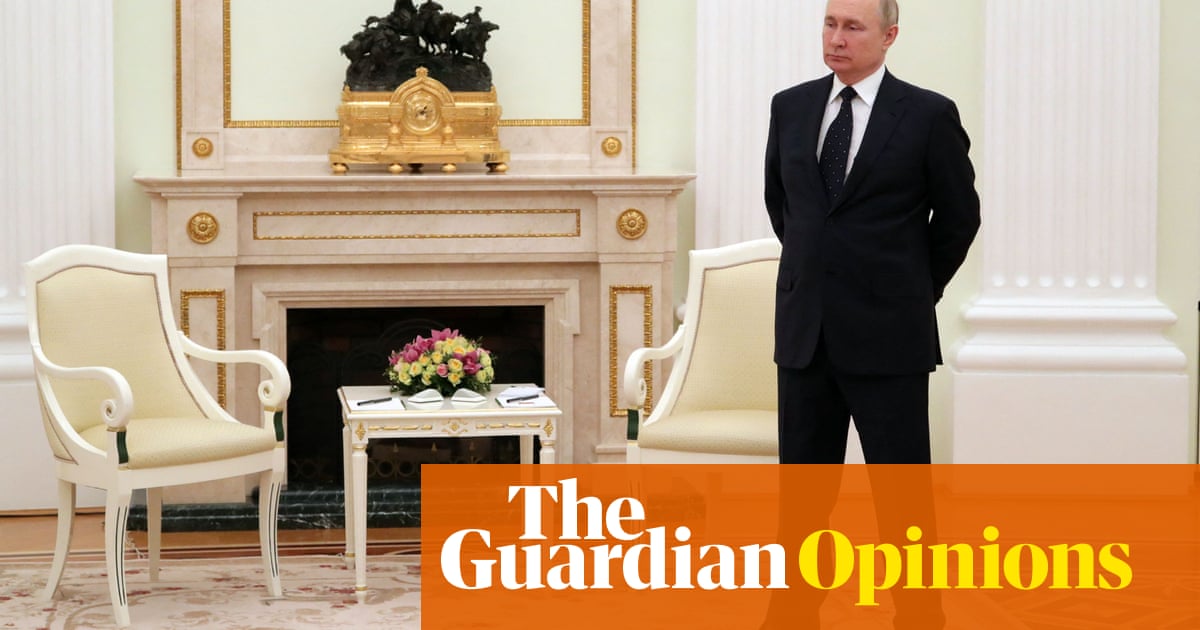To Vladimir Putin’s mind, chemical weapons might just seem a good idea
Show caption Vladimir Putin in the Kremlin as he waits for Belarus president Alexander Lukashenko, 11 March. Photograph: Mikhail Klimentyev/Sputnik/AFP/Getty Images Opinion To Vladimir Putin’s mind, chemical weapons might just seem a good idea Paul Rogers Knowing that he cannot afford to fail, Putin may be willing to use the most grotesque means to break Ukrainian resistance Sat 12 Mar 2022 10.00 GMT Share on Facebook
Share on Twitter
Share via Email
The Kremlin’s attempt to take the chemical weapons issue to the UN security council, claiming that the US and Ukraine might seek to deploy them, is widely seen as a device to distract from any future use by its own forces. The Pentagon has, more credibly, already voiced its concern that Vladimir Putin may choose to use them in the near future. But behind the mass media coverage is a more fundamental matter: why would the Kremlin even think about using chemical weapons?
And the problem for western leaders is that their advisers will be telling them that from Putin’s perspective there may actually be reasons for doing precisely this. Consider the following.
When Putin went to war he had a clear plan to achieve a specific aim: to take Kyiv, terminate the government and replace it with a client regime. In doing so, this would extend and confirm the Kremlin’s reach nearly 1,000km westward, consolidating the existing control of the Minsk regime. Both Belarus and Ukraine would have permanent Russian bases there, no doubt including nuclear-capable missiles. The whole security architecture of Europe would be changed in Putin’s favour. He would have made Russia great again.
The vision required a lightning military campaign catching Nato off guard, but it also required a quiescent Ukrainian population and limited military opposition
The plan came apart at the seams within 48 hours. Military resistance was intense, there were no welcoming crowds, and the Russian forces were often incompetent. Two days later, Putin delivered his threat to use nuclear weapons in response to any direct Nato intervention, while his own military forces began to regroup for a counter-city war.
Sixteen days into the war, even that is proving problematic. No major city has yet been captured – not even Kharkiv, despite huge damage inflicted. Even Mariupol is not under full Russian control in the face of appalling suffering for the tens of thousands still trapped there. Meanwhile, the Russian forces face major problems of morale while the Ukraine army is receiving thousands of anti-armour and other weapons, flooding across the borders from Nato states.
Putin can continue with his destructive counter-city assaults, but he will also be looking to other military postures. And it is here that the risk of chemical attacks come in, because there are two specific elements in their use that are relevant to Putin’s plan of attack. One is that they can be used against underground targets such as cellars, bunkers and even metro stations, and the other is to create widespread fear.
Chemical weapons come in five main forms – blister agents such as mustard gas, choking agents such as chlorine, blood agents such as cyanogen chloride, incapacitants such as chloroacetophenone (Mace) and, worst of all, nerve agents such as sarin, tabun and the V-agents. These last have been used by Russian agents in assassination attempts, including the Salisbury attack.
On 16 March 1988, Iraqi planes and artillery pounded the Kurdish town of Halabja in northern Iraq. Bombs and shells filled with sarin or mustard gas killed as many as 5,000 people, mainly women and children. The motive was to create fear right across Kurdish Iraq; a warning that opposing the Saddam Hussein regime would not be tolerated.
This was probably the worst single chemical attack since the first world war, but it came near the end of the eight-year Iraq/Iran war and got little more than muted criticism from the United States and its allies, as Iraq was then regarded as an ally against Iran.
A single massive assault like that is highly unlikely in Ukraine, but a few individual attacks against specific buildings in a Ukrainian town or city district are another matter. Heavier than air, chemical weapons will seep down into bunkers, cellars or even metro stations – among the few places in Ukrainian cities where people still feel some sense of security at a time of intense danger out in the open.
It would be a grotesque form of psychological warfare, yet it might be tempting for Putin. His initial plan failed and his whole vision now depends on pounding the cities until the Ukraine leadership has to accept his terms. So far, though, even that is not working, as the resilience of the Ukrainian people remains strong.
Putin cannot afford to fail. His future, that of those around him, and indeed his whole vision depend on success, and he has already used extreme violence to this end. The risk of chemical warfare may still be small, but it is there.
If Putin comes even close to considering it, the only thing holding him back may be the attitude of President Xi in Beijing. He is the one person Putin has no option but to heed.
• Paul Rogers is emeritus professor of peace studies at Bradford University and an honorary fellow at the Joint Service Command and Staff College













